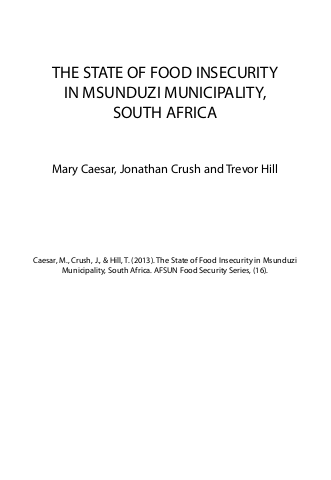Urban Food Security Series | #16

In order to better understand the nature and determinants of urban food insecurity in Southern Africa, the AFSUN baseline food security survey was implemented in 2008 and 2009 in 11 SADC cities, including Msunduzi. The Msunduzi questionnaire was administered to a sample of 556 households in the poorer parts of the city. The selected areas represent different types of neighbourhood including new and old townships, informal settlements and peri-urban areas with traditional housing. Households were randomly selected for interview within each area. Based on the results of the survey, this report does three things.
- First, it provides the first detailed empirical analysis of the prevalence and determinants of food insecurity at the household level in Msunduzi. The data provides a substantive basis on which to think about the complex policy challenges of mitigating food insecurity in the city.
- Second, the report examines the issue of which households are most vulnerable to food insecurity and which should therefore be targeted in any strategy to alleviate food inse- curity.
- And third, it examines the food sourcing and livelihood strategies deployed by households and shows that current proposals for eliminating food insecurity in the city need to be reconsidered.
Links
Resource collections
- UN Habitat - Urban Response Collection
- Urban Response - Urban Crisis Preparedness and Risk Reduction
- Urban Response Collection - Community Engagement and Social Cohesion
- Urban Response Collection - Economic Recovery
- Urban Response Collection - Environment and Climate Change
- Urban Response Collection - Housing, Land and Property
- Urban Response Collection - Urban Crisis Response, Recovery and Reconstruction
- Urban Response Collection - Urban Resilience